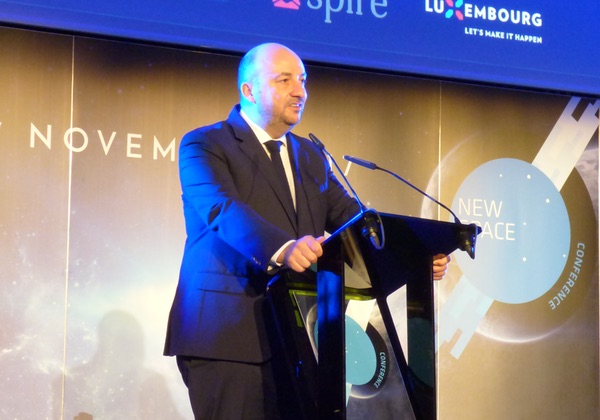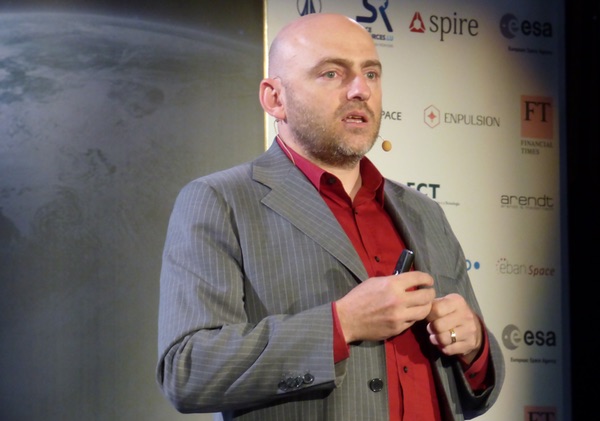Establishing a European NewSpace industryby Jeff Foust
|
| “Luxembourg is ready and eager to support and nurture the growing number of commercial space initiatives,” Schneider said. |
Such pitches by entrepreneurial ventures have become de rigueur at commercial space conferences in the US as startups seek attention and, with it, funding. The difference was that this conference was not taking place in San Francisco or Seattle but rather in Luxembourg City. These pitches wrapped up the first NewSpace Europe conference, an offshoot of the Space Frontier Foundation’s NewSpace Conferences in the US and a sign of how serious Europe—or, at least, some European countries—are in supporting entrepreneurial space companies.
Luxembourg made sense as a host for the conference as the country’s government has played an outsized role in entrepreneurial space. While space companies have long made Luxembourg a home—SES, one of the world’s largest operators of commercial communications satellites, was founded and remains headquartered in the country—the country made a splash last year with its new SpaceResources.lu initiative to support the development of asteroid mining and related companies (see “A small country’s big vision about small objects”, The Space Review, June 26, 2017).
The Luxembourg government’s support for space resources, including both providing funding for companies in this nascent sector and, this summer, passing a law providing property rights to companies that extract resources, similar to US law, has attracted a lot of attention. Yet, at NewSpace Europe, that effort was largely in the background.
“We didn’t even guess it would be such a success,” Étienne Schneider, deputy prime minister and minister of the economy of Luxembourg, said of SpaceResources.lu in opening remarks at the conference November 16. “What is most surprising to me is the excitement that is its generating across the world.”
While Schneider played up various aspects of the initiative in his speech, he also made it clear that Luxembourg’s interest was in more than just backing asteroid mining companies. In his speech, he noted a partnership with the European Investment Bank “to accelerate the development of new space technologies,” he said. Such collaborations, he said, demonstrate the “recognition of Luxembourg as an innovation leader in the EU.”
“Luxembourg is ready and eager to support and nurture the growing number of commercial space initiatives,” he said.
The biggest news to come out of the conference, in fact, was not linked to Luxembourg’s space resources effort. The day before the conference started, the government announced an agreement with Spire, the San Francisco-based startup developing a constellation of CubeSats that provide weather and ship-tracking data. A Luxembourg-based fund, the Luxembourg Future Fund, will participate in Spire’s latest funding round, valued at $75 million, and Spire, in turn, will establish a European headquarters in the country.
Spire CEO Peter Platzer, speaking at the conference November 17, said the Luxembourg office could grow to as many as 250 people, as the company scales up to harness the data products its satellite constellation makes possible. He added he would himself be moving to the country, singing the praises of the country’s multicultural and multilingual heritage.
“It’s an incredibly international city,” he said. “You have conversations that start in English and finish in Luxembourgish, and in between move through French, German, and Italian. As a European, it’s incredibly inspiring.”
 Étienne Schneider, deputy prime minister and minister of the economy of Luxembourg, mentioned the country’s space resources initiative but also other efforts to attract space startups to the company in a conference speech. (credit: J. Foust) |
European NewSpace challenges
Despite the red carpet rolled out by Luxembourg for both space resources and other commercial space startups, such ventures still face challenges in Europe. Those challenges are in some cases similar to those faced by American companies, but with distinct differences as well.
| “The space industry, particularly in Europe, has got a problem,” said Boggett, in how it focuses on technology versus business opportunities. “They’re still talking about technology—functions and features—and they’re not talking about business and the proposition of how they’re going to make money.” |
European startups, like those anywhere, often struggle to raise money. While, in the US, venture capital firms have become more willing to invest in space companies in recent years, European companies are still fighting to raise money, in part because there’s less VC funding in general in Europe.
“There are two barriers to the growth of startups. The first one is access to financing,” said Thibaud Delourme, team leader of the Space Data for Societal Challenges and Growth effort of the European Commission. He said that challenge was linked to the “different social models” between the US and Europe. In the US, he said, VC firms get their funding in large part from private pension funds, which are rare in Europe with government-backed retirement schemes. “We need to find alternative modes of financing.”
Some European companies have turned to US-based VC firms for financing. Iceye, a company based in Finland, had a Silicon Valley-based fund lead its Series A funding round. Pekka Laurila, co-founder and CEO of the company, said he did that deal on the condition that Iceye could remain in Europe, which it has even as it expands its business in the US.
Niels Buus, CEO of Danish smallsat developer GomSpace, said his company has found success by being publicly listed on a Swedish stock exchange. “That made it possible to fund our aggressive approach to the market,” he said.
There are also efforts to raise funding from wealthy individuals, similar to angel investors who have backed many American space companies. Sebastian Straube, the founder and chief executive of Interstellar Ventures, said that’s been difficult, as they don’t understand the risks of space investments well, and prefer to put their money in real estate or other more conventional investments. “The old money is very hesitant to invest in space,” he said.
Many space startups have turned to government grants for initial support. That can be an effective way to fund technology development without giving up equity, but one investor argued that it can distort the growth of startups.
“The space industry, particularly in Europe, has got a problem,” said Mark Boggett, managing director of Seraphim Capital, a fund that invests in space companies. “In order to successfully go through that grant process, the entrepreneur has to be very technical about the way they approach the business.”
That, he said, skews the company’s focus when they later seek private investors. “They start speaking to VCs and angels, but the problem is they don’t change their terminology,” he said. “They’re still talking about technology—functions and features—and they’re not talking about business and the proposition of how they’re going to make money. That’s really a big problem.”
| “When you have a US president who is turning back from the COP 21 [climate change] agreement, do you really want to invest in an Earth observation company, or create an Earth observation company, based in the United States?” said Delourme. |
The second challenge that Delourme identified was more structural, what he called the “economics of creative destruction.” “If you want newcomers to be creative, if you want new sectors to appear, you have to have old ones disappear. You have to have old companies, that are not productive, to disappear, because there’s a competition for access to resources, access to finance, access to labor.”
Europe’s social safety net, he said, is critical to enabling that process, but he suggested European labor laws needed updating to be more supporting of that “creative destruction” process. “We also need to work on our labor market regulations to make sure it’s actually quite easy to move from one job to another,” he said.
America vs. Europe
Delourme argued that some NewSpace companies have a particular advantage being in Europe versus the US, particularly in the area of Earth observation.
“I think we are bold,” he said on a panel after Straube argued that Europe needed to be bolder when it comes to attracting space businesses. He cited the work done on EU’s Copernicus Earth observation and Galileo satellite navigation programs, enabling tens of thousands of jobs both building satellites as well as the “downstream” jobs from applications enabled by data from those systems.
“I think Europe has a lot of advantages compared to the States,” he said, citing the expertise available in the country, a well-trained workforce, as well as access to a single market across the EU larger than the United States.
“I think we have the right political momentum,” he added. “When you have a US president who is turning back from the COP 21 [climate change] agreement, do you really want to invest in an Earth observation company, or create an Earth observation company, based in the United States? No, you do it where there is the political momentum to do it.”
But what exactly is a European company? Planet, a US-headquartered company that operates the world’s largest constellation of Earth observation satellites, has a significant presence in Europe. About a quarter of the company’s workforce is in Europe, said Agnieszka Lukaszczyk, EU policy director at the company, including a satellite operations center in Berlin that dates back to RapidEye, a German venture that launched five medium-resolution satellites that was later acquired by Planet.
Despite its European footprint, though, Lukaszczyk said the company is struggling to be considered European by the EU. “We are focusing on climate change. We are giving away data for disaster management,” she said. “Yet, we’re still not considered a European company, and we have a very hard time to actually get funding and support from the European Union.”
Delourme didn’t explain why Planet was facing those difficulties, but believed the company could apply for an EU program where the government purchases private data to supplement that from the Copernicus satellites. “I’m extremely happy to see Planet invest in Europe,” he said. “Europe is the place to be if you want to invest in space at the moment.”
| “I’m extremely happy to see Planet invest in Europe,” Delourme said. “Europe is the place to be if you want to invest in space at the moment.” |
Well, maybe. At the end of the first day of the two-day NewSpace Europe conference, it hosted the awards ceremony for the Space Exploration Masters competition, organized by German company AZO in cooperation with ESA. Several companies received prizes for new technologies or business models related to space ventures.
While the competition was billed as a European one, not all the winners were based in Europe. One prize, sponsored by Stevenson Astrosat Ltd. and the Huntsville/Madison County Chamber of Commerce, went to a small US venture, SustainSpace, that is interested in plant growth technologies to produce “rapidly evolving and improving populations of plants in the space environment.” (The US-based cosponsor of this prize was linked to the use of Sierra Nevada Corporation’s Dream Chaser vehicle, which the chamber of commerce hopes will one day be landing at Huntsville’s airport.)
At the end of the awards ceremony, the competition awarded an overall prize. ESA officials, including director general Jan Wörner and David Parker, director of ESA human spaceflight and robotic exploration, took the stage for the announcement. “It’s raising the image of exploration as being a home for innovation in ESA,” Parker said of the competition. “It’s important for the ideas that have been generated.”
The winner of the overall award? SustainSpace, the American company.
